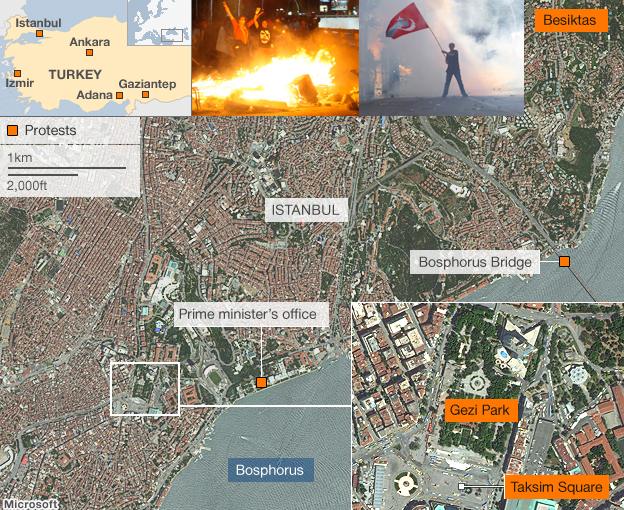Turkey protests resume in Istanbul after apology
- Published
The violent scenes came just hours after Deputy Prime Minister Bulent Arinc apologised for the police response to initial protests last week
Police in the Turkish city of Istanbul have used tear gas and water cannon against protesters in a fifth night of anti-government demonstrations.
The clashes came hours after Deputy Prime Minister Bulent Arinc apologised for the violent police response to initial protests last week.
Mr Arinc is due to hold a meeting with activists later on Wednesday.
Protests over the demolition of a park in Istanbul have grown into days of unrest across the country.
Mr Arinc apologised to protesters injured in demonstrations opposing the redevelopment of Gezi Park.
He said the original protests were "just and legitimate" and the "excessive use of force" by police was wrong.
Ahead of a proposed meeting in Istanbul, activists issued a list of demands, including the end of plans to demolish the park, a ban on tear gas, the release of arrested protesters and the resignation of top officials blamed for the protest crackdown, the BBC's Mark Lowen in Istanbul reports.
The atmosphere on Istanbul's Taksim Square on Tuesday evening was almost celebratory as a huge crowd of people ranging from football fans to well-heeled professionals gathered, the BBC's Paul Mason reported.
People have been chanting "Have you heard us?" in the hope the government is listening to their demands.
But later, police fired tear gas, water cannon and smoke grenades as they tried to disperse protesters.
In the city of Izmir, there was a festive atmosphere and police kept their distance, though some young protesters earlier smashed security cameras and threw bricks, the BBC's Quentin Sommerville reports.
Turkey's Deputy PM Bulent Arinc: "The use of excessive force shown against the people who initially started this protest... was wrong and it was unfair'
'Undemocratic'
Also in Izmir, state-run Anatolia news agency reported that police had arrested 25 people for tweeting "misinformation".
An official from the opposition Republican People's Party (CHP), Ali Engin, told Anatolia they were being held for "calling on people to protest".
Prime Minister Recep Tayyip Erdogan said on Sunday that Twitter was a "menace" being used to spread "lies".
In his comments Mr Arinc called for the demonstrations to end, saying they had been taken over by "terrorist elements".
Mr Arinc's conciliatory remarks contrast with the tougher line taken by Mr Erdogan, who says the protests are undemocratic.
Speaking during a trip to Morocco, Mr Erdogan told reporters: "On my return from this visit, the problems will be solved."
Meanwhile Turkish television station NTV has apologised for failing to cover the initial protests.
The chief executive of the conglomerate that owns NTV, Cem Aydin of Dogus, said criticism of the channel was "fair to a large extent".
"Our audience feels like they were betrayed," he said after a meeting with staff, some of whom resigned in protest at the lack of coverage.
Protesters have turned to social media to spread their message and coordinate demonstrations, the BBC's Sophie Hutchinson reports from Istanbul.
Earlier on Tuesday the left-wing Kesk trade union confederation, representing some 240,000 public sector workers, began a two-day strike in support of the protests and accused the government of committing "state terror".
Another trade union confederation, Disk, has said it will join the strike on Wednesday.
'Authoritarian tendency'
The protests began on 28 May over plans to redevelop Gezi Park near Taksim Square in Istanbul.
They soon mushroomed, engulfing several cities and including political demands.
Officials have confirmed two deaths in the protests. One man died after being shot by an unidentified gunman in the southern city of Antakya.
Another died after being hit by a car that ploughed into a crowd in Istanbul.
The Turkish Human Rights Association, an NGO, said more than 2,800 protesters had been injured across the country, many of them seriously, and that 791 had been detained, of whom "around 500" have since been released.
Mr Arinc said that 244 police officers and 64 protesters had been injured, and more than 70m Turkish lira (£24m; $37m) worth of public damage had been caused.
Protesters accuse the Turkish government of becoming increasingly authoritarian.
Mr Erdogan is still the most popular politician in the country, but he is discovering that a ruling style that his opponents say is autocratic has its limits, the BBC's Middle East Editor Jeremy Bowen reports from Istanbul.
Mr Erdogan's Turkey was seen as a runaway success by many in Europe and the Middle East; now it is looking tarnished, with deeper problems than its allies - and enemies - realised, he adds.
